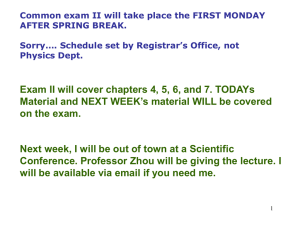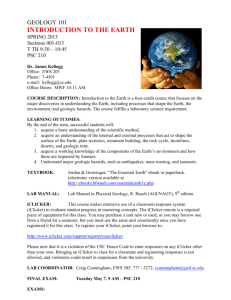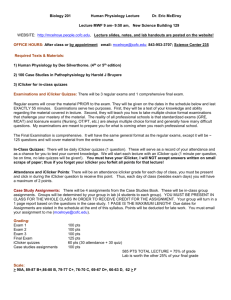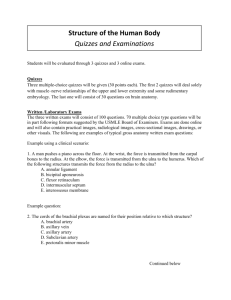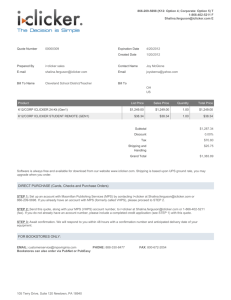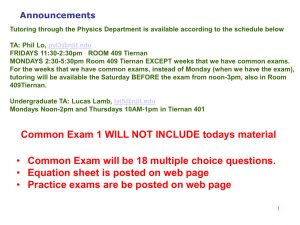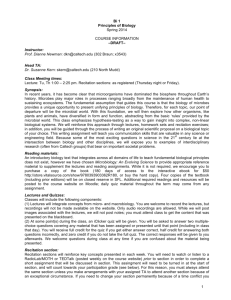Physics 101
advertisement
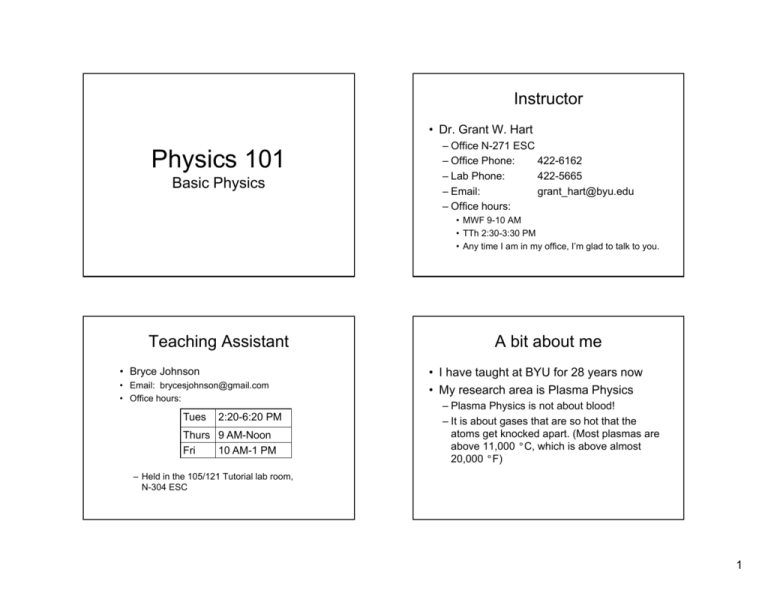
Instructor • Dr. Grant W. Hart Physics 101 Basic Physics – Office N-271 ESC – Office Phone: 422-6162 – Lab Phone: 422-5665 – Email: grant_hart@byu.edu – Office hours: • MWF 9-10 AM • TTh 2:30-3:30 PM • Any time I am in my office, I’m glad to talk to you. Teaching Assistant • Bryce Johnson • Email: brycesjohnson@gmail.com • Office hours: Tues 2:20-6:20 PM Thurs 9 AM-Noon Fri 10 AM-1 PM A bit about me • I have taught at BYU for 28 years now • My research area is Plasma Physics – Plasma Physics is not about blood! – It is about gases that are so hot that the atoms get knocked apart. (Most plasmas are above 11,000 (C, which is above almost 20,000 (F) – Held in the 105/121 Tutorial lab room, N-304 ESC 1 My Family Tell me about you • There will be a chance to do this later in Reading Quiz # 1. Class Organization Activity Pre-class quizzes (26, 5 points each, drop 4) iClicker quizzes (26, 3 points each, drop 4) Homework assignments (18, drop 2, 10 points) Home experiments (all 5, 25 points each) Practice exams (all 3, 25 points each) Midterm exams (all 3, 100 points each) Final exam (200 points) Totals: Extra credit (50 points maximum) Possible Points Pre-Class Quizzes Percent of Grade 110 66 160 125 75 300 200 1036 10.6% 6.4% 15.4% 12.1% 7.2% 29.0% 19.3% 100% 50 4.8% • You will take an pre-class reading quiz the day before the class period where we cover new material. • There is a list reading questions on each section to guide your reading. • There will be some simple applications of the concepts that you have read. • You will have the opportunity to ask questions about the material so it can be discussed in class. • 5 points/quiz. They will be graded loosely. 2 In-Class Quizzes • Each day we will have several iClicker quizzes. • I will ask you to discuss your answer with your neighbor and then answer with your iClicker. • Participation is the most important thing here, so you will be graded on participating, not on whether you get the right answer. Homework Assignments • 10 points each • One assignment per chapter. • On Learning Suite. Must be submitted by 11 PM on the due date on the schedule. Register your iClicker • You will need to register your iClicker at http://gardner.byu.edu/101f/quizid.html • There will be a link to this site from Learning Suite. • There is a web site label on the back of your iClicker. This site may be useful for your other classes, but not for this class. Home Experiments • 5 in the semester. It is best if two of you work together to do it, but each writes up their own 1-2 page report. 3 Practice Exams • 3 practice exams to be carried out before the review period. • They will be on Learning Suite. • They will be discussed in the review period. • They are worth 75 points overall, so don’t forget them. They can lower your grade by one or two notches if you don’t do them. Extra Credit • 50 points possible during the semester. • 4 points maximum per chapter. • Any question not divisible by 3: ½ point each • Even-numbered Exercises: 1 point each • Even-numbered Synthesis Problems: 2 points each Midterm Exams • There will be three midterms during the semester. • Multiple choice part in the Testing Center • Essay part is on Learning Suite. It is due the last day of the exam. • If you desire, you can retake a different version of the exam on the days scheduled. These retakes cost $5.00 each. It does not include the essay portion. What we will do in class • I will discuss the main ideas of the material in the reading assignment. • We will have physical demonstrations of some of the concepts involved. • I will pose questions that you will answer and discuss with a neighbor to illustrate the ideas. We will use the clickers in class for these questions. • We will work through some problems together in class. • PowerPoint slides will be posted for each lecture on Learning Suite. 4 What is science? • More than anything, science is a method of learning about the world by observing and measuring what happens and creating testable hypotheses about what is seen. • The most important step is the feedback of further measurements onto the hypotheses or theories, refining them so that they cover a larger range of experience. Physics • • • • • • • • • • Mechanics – The study of forces and motion Thermodynamics – temperature, heat, energy Electricity and Magnetism – electric forces & currents Optics – light Atomic physics – properties of atoms Nuclear physics – properties of nuclei Particle physics – subatomic particles Condensed matter physics – solids and liquids Acoustics – sound and sound waves Plasma Physics – properties of plasmas Physics • Physics covers the basic nature of matter and its interactions. It is subdivided into the following major subfields: Why do we use Math? • Math is a shorthand way of writing relationships along with a way of manipulating them so that the result is true if the starting point is true. • Any mathematical equation or operation can be stated in words, but the math is much more concise. 5 Units and Standards • Measurements are necessary. • Why do we use Metric units? – The rest of the world uses them, so we can communicate with each other. – Easy conversion from one to another. Applications • We will try to present lots of things that are related to things that occur all around you. Keep your eyes open and you will see the principles we discuss in action everywhere. • Scale of the Universe • See the Powers of 10 video link on the Learning Suite page. 6
